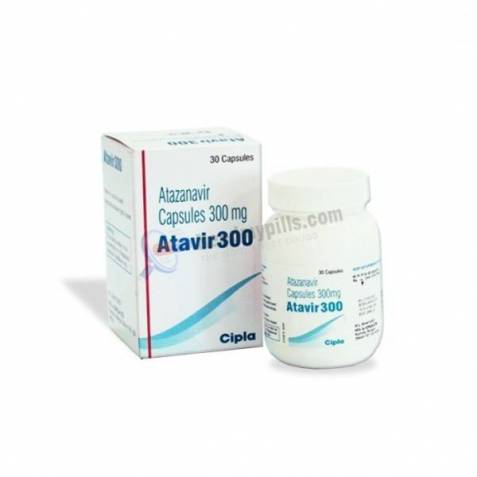What is Atavir 300 Mg?
HIV (human immunodeficiency virus) infection can be treated with the antiretroviral medicine Atazanavir, which is the active ingredient of the pharmaceutical Atavir 300 Mg. It is a type of drug known as a protease inhibitor.
The active ingredient in Atavir 300 mg blocks an enzyme necessary for viral replication. This method aids in lowering the body's viral load and halting the disease's progression.
Combination therapy with other antiretroviral medications typically includes the medication. Never ignore or miss a dose of Atavir 300 mg unless otherwise directed by your doctor. If you want your body to absorb more of it, take it with food.
What are the Uses of Atavir 300 Mg?
Adults with HIV (human immunodeficiency virus) are the target population for Atavir 300 Mg treatment. It is used in conjunction with other antiretroviral medications as part of a therapy known as combination therapy.
Infection with HIV reduces the body's ability to fight off other diseases and illnesses. Inhibiting the protease enzyme, which is necessary for the replication of the virus, is one way that Atavir 300 mg helps to slow down the progression of the disease. This decreases the number of viruses in the body and boosts the immune system.
Adults who have never been treated for HIV infection or who have shown resistance to other antiretroviral drugs may be prescribed 300 mg of atavir once daily. HIV infection cannot be cured with this treatment, although it can be controlled and the patient's quality of life enhanced.
Atavir 300 Mg Side Effects
Most Common Side Effects of Atavir 300 Mg includes:
- Nausea
- Diarrhea
- Pain in the belly
- Headache
- Rash
- Jaundice (yellowing of skin or eyes)
- A rise in liver enzyme levels
- Fatigue
- Dizziness
- Insomnia
- These adverse reactions are typically modest and disappear without treatment after a few days or weeks. But, if they continue or worsen, you should consult a doctor.
- Atavir 300 mg may rarely cause major adverse effects, such as:
- Extreme sensitivity to allergens (such as rash, itching, hives, difficulty breathing, or swelling of the face, lips, tongue, or throat)
- Damage to the liver (such as liver failure, hepatitis, or liver inflammation)
- Nephrotic syndrome (such as kidney stones or kidney failure)
- Adaptations in fat storage (such as increased fat in the upper back, neck, and breasts, and loss of fat from the legs, arms, and face)
- Diabetes mellitus (which can lead to diabetes)
- Pancreatitis (inflammation of the pancreas)
- Get emergency medical assistance if you suffer any of these potentially life-threatening adverse effects.
- Keep in mind that your doctor ordered 300 mg of Atavir because he or she believes the benefits to you will outweigh the dangers. Discuss the potential risks and benefits of taking Atavir 300 Mg with your doctor if you have any concerns or questions.
Interactions of Atavir 300 Mg With Other Drugs
Interactions between Atavir 300 Mg and other pharmaceuticals and treatments can alter the drug's effectiveness or raise the likelihood of unwanted side effects. Before beginning treatment with Atavir 300 Mg, you must tell your healthcare provider about any drugs, vitamins, and herbal items you are currently using.
Atavir 300 mg may interact with some medications, including but not limited to:
Absorption of Atavir 300 mg can be reduced by medications that reduce stomach acid, such as proton pump inhibitors or H2 blockers.
Drugs like rifampin that cause an increase in liver enzymes can lessen the effectiveness of Atavir 300 Mg.
Acetaminophen, isoniazid, and alcohol are all drugs that can raise the risk of liver issues.
Drugs like blood thinners and antiplatelet medications can cause excessive bleeding.
Atavir 300 Mg may interact with drugs other than those listed here. All of your prescriptions, including prescription and over-the-counter, as well as vitamins, supplements, and herbal remedies, should be disclosed to your healthcare professional.
Warning
When used as directed, Atavir 300 Mg is unlikely to cause serious adverse effects, but there are a few precautions you should take note of.
Atavir 300 mg carries the risk of causing liver disorders such as hepatitis, inflammation, and even liver failure. When using the medication, your doctor will keep a close eye on your liver. Tell your doctor if you have a history of liver disease or if you take any medications that may affect your liver.
When combined with other blood-thinning or antiplatelet medications, Atavir 300 mg can increase the risk of bleeding. If you notice any odd bleeding or bruises, don't hesitate to contact your doctor.
Atavir 300 mg carries the potential for adverse skin responses including redness, itching, and hives. Stevens-Johnson syndrome and toxic epidermal necrolysis are two potentially fatal skin responses that might occur rarely. Tell your doctor right away if you develop any skin reactions from taking the medicine.
The risk of hyperbilirubinemia increases when taking Atavir 300 mg, and this can manifest as a yellowing of the skin or eyes. In most cases, this is a minor adverse effect that can be ignored.
Atavir 300 mg may interact with other drugs, including those bought without a prescription as well as vitamins, minerals, and herbs. Be honest with your doctor about the medicines you're currently using.
Atavir 300 mg carries a high risk of causing renal problems such as kidney stones or even kidney failure. While you are on the medicine, your doctor will routinely check your kidney function.
Be sure to tell your doctor if you experience any adverse reactions or have any other worries. Talk to your doctor if you have any concerns or questions about using Atavir 300 mg.




 0 / Reviews /
Write a Review
0 / Reviews /
Write a Review
